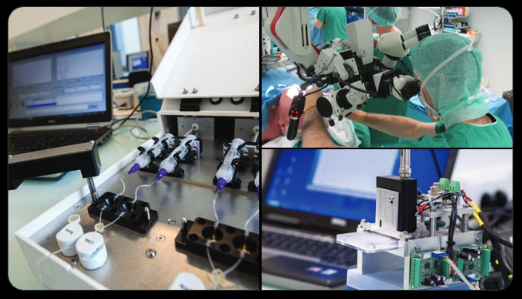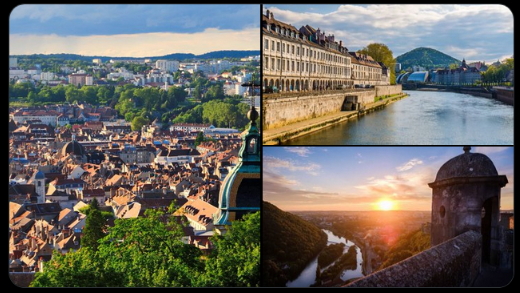PhD position
posted on September 15, 2025
2 PhD positions on the mechanics and psychophysics of tactile perception
Application deadline: Oct. 31st, 2025
Start date: Fall-Winter 2025
The Mecanochemistry and Tribology team and the Femto Neuro group, both located in the FEMTO-ST Institute in Besançon, France are excited to announce the opening of 2 PhD positions in mechanical engineering and tactile psychophysics, in close industrial collaboration with a major cosmetics manufacturer.
The two positions are funded by CNRS, with generous support from one industrial collaboration, and will be jointly supervised by Prof. Pierre-Henri Cornuault (ECTO team, FEMTO Dept. of Mechanical Engineering) and Dr Jean-Julien Aucouturier (Neuro team, FEMTO Dept. of Automation and Robotics). The positions will be based in Besançon, with regular fully-funded trips to the industrial site in Paris.
The science
Tactile perception results from the activation of populations of skin mecanoreceptors which respond selectively to the mechanical forces and vibrations induced by friction when the finger explores a texture or material, with spatial sensitivity down to the nanometer scale (Skedung et al. Scientific Reports 2013). The response of mechanoreceptors is then propagated to the central nervous system, and processed to create percepts of whether the material is e.g. soft, rough, slick or sticky (McGlone, Wessberg, & Olausson, Neuron 2014).
While the majority of tactile perception research has focussed on mechanical properties of solid surfaces (Louyot et al., Tribology International 2024, the large part of human tactile interactions with the environment involves soft or complex materials (e.g. bundles of fibers), and multi-finger contacts (e.g. pinching) for which almost nothing is known. First, we lack experimental apparatuses (i.e. tribometers) that are able to measure mechanical signals and induced vibrations when a human finger or hand interacts with such materials. Second, we do not understand the psychophysics of such contacts, i.e. how various mechanical signals are cognitively converted to a percept of e.g. soft- or roughness.

Figure: Example of a custom-built tribometer (© ECTO team, FEMTO-ST Institute) measuring mechanical signals at the interface between a finger and a solid surface. No such apparatus exists to study tactile interactions with soft or complex materials. Louyot et al., Tribology International 2024.
The collective goal of the two PhD positions is to bridge this gap and provide both the experimental developments and the psychophysical studies (using the new research instruments) to characterize multi-finger interaction with soft/complex materials. The project presents an exciting mix of science and technology, as well as practice and theory - spanning both applied mechanical science, sensors and actuators, psychophysics and cognitive science, all in the aim to tackle a fundamental question about tactile perception with wide ranging applications, from e.g. tactile or cosmetics product design to the assessment of pathologies of tactile perception.
The environment
The project is a ongoing collaboration between the Femto Neuro group and the Mecanochemistry and Tribology team, FEMTO-ST Institute in Besançon, France. The PhD students will be supervised by Prof. Pierre-Henri Cornuault (Prof. Université de Franche-Comté, ECTO team) and Dr Jean-Julien Aucouturier (Directeur de recherche CNRS, Neuro team). The project will feature a close industrial collaboration with a major cosmetics manufacturer, and provide ample opportunity for research stays at the manufacturer’s R&D facilities in Paris.
 With more than 750 researchers, the FEMTO-ST Institute (CNRS/Université Marie et Louis Pasteur) is the region’s largest engineering CNRS lab, with expertise covering all fields of system science. The ECTO team is based in FEMTO’s Department of Applied Mechanics which hosts about 110 researchs active in the field of materials, surfaces, processes and structures. The neuro group is based in FEMTO’s Department of Automation and Robotics, which hosts about 80 researchers active in the fields of robotics, mechatronics, automatic control and artificial intelligence. Both departments are located in the same building, and have a long history of working together.
With more than 750 researchers, the FEMTO-ST Institute (CNRS/Université Marie et Louis Pasteur) is the region’s largest engineering CNRS lab, with expertise covering all fields of system science. The ECTO team is based in FEMTO’s Department of Applied Mechanics which hosts about 110 researchs active in the field of materials, surfaces, processes and structures. The neuro group is based in FEMTO’s Department of Automation and Robotics, which hosts about 80 researchers active in the fields of robotics, mechatronics, automatic control and artificial intelligence. Both departments are located in the same building, and have a long history of working together.
 A world-heritage UNESCO site close to the French-Swiss mountains of Jura, Besançon is a vibrant, mid-size regional capital city regularly ranking best-in-France for its quality of life and surface green spaces per inhabitant, but also boasts a newly-federated university (Université Marie et Louis Pasteur) of more than 50k students.
A world-heritage UNESCO site close to the French-Swiss mountains of Jura, Besançon is a vibrant, mid-size regional capital city regularly ranking best-in-France for its quality of life and surface green spaces per inhabitant, but also boasts a newly-federated university (Université Marie et Louis Pasteur) of more than 50k students.
Applicants
We anticipate the opening of two PhD positions: funding for one is already confirmed, for a tentative start in Dec. 2025; funding for the second is pending, for a start in 2026. We are accepting applications for both positions as of 11th Oct. 2025.
The ideal applicants for these two positions hold a Master of Science in mechanical engineering or tactile psychophysics. One position (position A) is anticipated to focus more on experimental development (conception and validation of a tribometer), and may offer best training potential for applicants who already have a solid background in mechanical engineering, as well as programming experience with sensors and actuators in languages like Matlab or LabVIEW. The second position (position B) is anticipated to focus more on psychophysics (experimental study of tactile perception), and may offer best training potential for applicants who already have a solid background in psychophysics or experimental psychology, as well as data-analysis experience in languages like Python or R. Position A is expected to start in 2025, and position B in 2026.
How to apply:
Applications open: 13th Oct. 2025
Application deadline: 31st Oct. 2025
Interviews: 27th Oct. - 3rd Nov 2025
Feedback given: 3rd Nov 2025 - 7 Nov. 2025
Expected start date: 1st Dec. 2025 - 1st Feb. 2026
Applications must be done solely via the CNRS employment portal, at this LINK (link opens 13/10/2025). In more details, the link concerns the application for the first PhD position (position A). However, we suggest that applicants who may feel their background and interest better fit position B nevertheless apply to position A via this link, as the project offers flexibility on the calendar of both positions. Applicants are encouraged to comment on what aspects of the project is most interesting for them in a cover letter.
For informal enquiries, please contact:
Pierre-Henri Cornuault (pierre_henri.cornuault@univ-fcomte.fr) & Jean-Julien Aucouturier (jj.aucouturier@pm.com). Note that applications should only be submitted via the link above, and applications received by email will not be processed.